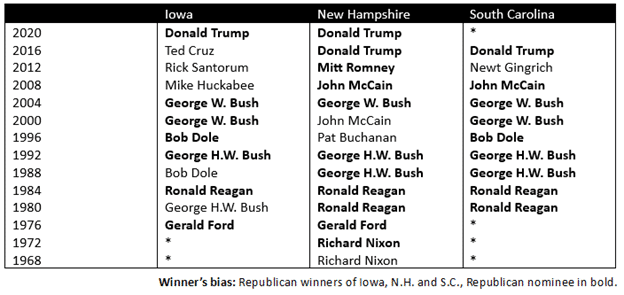January 15, 2024
Permission to republish original opeds and cartoons granted.
After Iowa, New Hampshire and South Carolina, fuhgeddaboudit!
By Robert Romano
Since the advent of the Iowa caucuses in 1972 and the South Carolina primary in 1980, the “first in the nation” political contests, including the New Hampshire primary which dates back to 1916, have been able to consistently end up selecting who the nominee for President will eventually be particularly for Republicans
In fact, you cannot find a Republican nominee for president in modern history that did not win either Iowa or New Hampshire. For its part, “first in the south” South Carolina has predicted the ultimate nominee every year except for 2012, when it selected Newt Gingrich.
In years without a sitting Republican president on the ballot — 1980, 1988, 1996, 2000, 2008, 2012 and 2016 — Iowa and New Hampshire have delivered opposite results. Neither chose the same candidate.
2024 will put that to the test, with former President Donald Trump leading Florida Gov. Ron DeSantis and former South Carolina Gov. Nikki Haley in polls in Iowa, New Hampshire and South Carolina, according to the RealClearPolitics.com averages of polls compiled. In New Hampshire Trump has led 93.5 percent of the polls taken (DeSantis led a couple of them very early in the process), and in Iowa and South Carolina, Trump has led 100 percent of the polls taken.
In years without an incumbent Republican president, Iowa correctly chose the party’s ultimate nominee in 1996 and 2000, Bob Dole and George W. Bush, respectively. New Hampshire took the other five: Ronald Reagan in 1980, George H.W. Bush in 1988, John McCain in 2008, Mitt Romney in 2012 and Donald Trump in 2016.
South Carolina beats them both, having chosen the eventual nominee six out of seven times. But, it is worth noting that coming slightly later in succession, South Carolina voters have the benefit of seeing the other early contests play out.
The one time South Carolina got it wrong, in 2012, happened to be a year when it did not select one of the winners of Iowa or New Hampshire.
So, Iowa and New Hampshire choose the players and breaks the field down, but South Carolina tends to decide the outcome of the GOP contest.
The importance of the early contests is shared on the Democrat side, too, but to a lesser extent as there are a couple of notable exceptions. Joe Biden and Bill Clinton managed to secure the nominations in 2020 and 1992, respectively, without winning either Iowa or New Hampshire, and so did George McGovern in 1972.
Still, about 60 percent of the years where no incumbent Democrat was running — 1976, 1984, 1988, 2000, 2004, and 2008 — the nominee had won either Iowa or New Hampshire.
With more than three decades of compelling evidence, then, a virtual monopoly emerges for Iowa, New Hampshire, and South Carolina selecting the Republican presidential nominee.
Call it winner’s bias. Voters want to associate with a winner, and they do not wish to waste their votes on someone whom they perceive cannot win.
Consider the prospect of placing a sizeable bet on a horse — after the race has already begun. The further behind in the race the stallion is, the greater risk he or she will never catch up. If the lead appears to be insurmountable, comparatively fewer bets would be made.
Meaning the later the primary or caucus occurs in the process, the less important it becomes to the overall outcome. And the choice becomes less ideological since perceived electability, based on prior results, becomes a primary concern moving forward.
The winner’s bias then becomes undeniable.
Those later voters also get comparatively fewer choices, since as time goes on and resources are exhausted, more candidates tend to drop out of the race.
The same thing will happen in 2024. Meaning, after the first three contests in the Republican field, expect to see the eventual nominee being the one who won two out of three of these contests. After Iowa, New Hampshire and South Carolina, fuhgeddaboudit!
Robert Romano is the Vice President of Public Policy at Americans for Limited Government Foundation.
To view online: https://dailytorch.com/2024/01/after-iowa-new-hampshire-and-south-carolina-fuhgeddaboudit/

